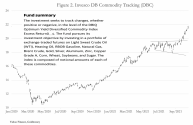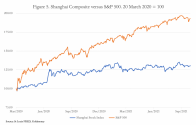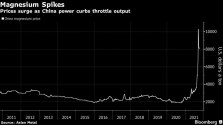A TALE OF TWO CIVILIZATIONS
Authored by Alasdair Macleod (21 OCTOBER 2021)
In recent years, America’s
unsuccessful attempts at containing China as a rival hegemon has only served to promote Chinese antipathy against American capitalism. China is now retreating into the comfort of her long-established moral values, best described as
a mixture of Confucianism and Marxism, while despising American individualism, its careless regard for family values, and encouragement of get-rich-quick financial speculation.
The outcome of the Taiwan issue is likely to be decided by the evolution of economic factors. China is protecting herself against a global credit crisis by restraining its creation, while America is going full MMT
[Modern Monetary Theory or Modern Money Theory -- in a nutshell, it is an economic theory that suggests that governments that issue their own fiat currencies should print as much money as they need]. The outcome is likely to be a combined financial market and dollar crisis for America, taking down its Western epigones as well. China has protected herself by cornering the market
for physical gold and SECRETLY accumulating as much as 20,000-30,000 tonnes in national reserves.
The wealth disparity between city and country has become an important political issue, which is why as well as refocusing resources towards agriculture Xi has clamped down on super-rich entrepreneurs and their record-breaking IPOs. In his COMMON PROSPERITY POLICY, Xi declared that he was not prepared to let the gap between rich and poor widen, and that
Common Prosperity was not just an economic issue but
“a major political issue related to the party’s governing foundations”.
Following decades of communism under Mao, after China’s initial recovery and development Xi is
now clamping down on UNFETTERED capitalism. He and his advisers have observed the DISINTEGRATION of family values in America and the rise of INDIVIDUALISM at the expense of family life; and with popular culture how these trends are being adopted by China’s youth. The state has now shut down western-style social media, and erased celebrity culture.
The social impact of CULTURAL CHANGE is often overlooked, but it is at the FOREFRONT of China’s policy-makers’ consideration. For millennia, a state-controlled Chinese civilisation endured. Never sympathetic to free markets, statist thoughts have turned inwardly to Confucius and Marx to escape the obvious failings of American capitalism and its decline from familial values to individualism and rampant speculation.
This is what Xi reflects in his presidency. His chief adviser, his éminence grise, is Wang Huning who operates in the political shadows. From all accounts, Wang is extremely clever, speaks French and English, spent a year in America and is a deep thinker who, having examined them, has rejected western values in favour of Chinese tradition.
Wang appears to be promoting a Confucian/Marxist hybrid civilisation which is intended to unify China’s many ethnic groups in a government-set culture, reverting to a morality of yesteryear. Comparing China’s future with that of American democracy and its moral degradation, the approach is understandable and enjoys popular support. All one can say is that so far, the Chinese appear to have made considerably less of a mess managing their economy and currency compared with America’s Federal Government and its central bank.
The political consequences are also important. By stemming the tide of Western moral decadence in her own territory China is
insulating herself from the rest of the American-dominated world. This is being bolstered by steps to shift the emphasis from the export trade towards domestic consumption to improve living standards. In the process China will become more of an economic fortress, mainly interested in Africa and the Americas as sources of raw materials and commodities rather than as export markets to be fostered. China’s internationalism of the last four decades is increasingly redirected and confined to the Eurasian continent over which she exercises greater degrees of political and economic control. Which brings us back to the issues of Taiwan and the South China Sea, which China sees as consolidating her rightful political and cultural borders.
Like the Marxist professors in the universities, China’s thinkers, such as Wang Huning and President Xi himself, always believed America to be
politically and morally rudderless and would destroy itself. Presumably the election of an unpredictable Trump followed by a President Biden who appears to be in a geriatric decline is seen in Beijing as evidence that American society is indeed rudderless and imploding.
It was against this likely event that
in 1983 far-sighted Chinese strategists began to accumulate gold and to corner the word market for bullion. It would have been obvious to them that one day, dancing with the capitalist devils would become too dangerous and China’s future would have to be secured at the outset long before a capitalist collapse.
Accordingly, the Regulations on the Control of Gold and Silver were promulgated on 15 June 1983, appointing the People’s Bank (PBOC) with sole responsibility for managing China’s gold and silver while private ownership remained banned. The PBOC then began to acquire gold from foreign markets, a task made easier by the 1980-2002 bear market. Meanwhile, the government threw substantial resources into developing gold mining, and
became the largest gold producer in the world by a substantial margin, overtaking South Africa, Russia, and the United States. State owned refineries took in doré from abroad, adding to the accumulation.
It was only after the PBOC had accumulated sufficient bullion from imports and domestic production that she
set up the Shanghai Gold Exchange in 2002 and permitted Chinese citizens to acquire gold. The government
even ran advertising campaigns encouraging the purchase of gold, and since then, over 19,000 tonnes have been delivered into private sector ownership from the SGE’s vaults.
Together with the total ban on exports of Chinese refined gold, the pre-2002 ban on private ownership while the state acquired sufficient bullion for its purposes, coupled with the subsequent encouragement to the public to do the same, China clearly regarded gold as her most important strategic asset. It has
still not shown its hand, but given the likely amounts involved, to do so
would risk destabilising the dollar-centric fiat currency world. Until it happens, we should assume that the 20,000-30,000 tonnes likely to have been accumulated in various state accounts since 1983 is an INSURANCE POLICY against the failure of American capitalism and the world’s reserve currency.
This brings us back to the Taiwan question. For China, the re-absorption of Taiwan may become a simpler matter when the capitalistic Americans are economically at their weakest and the dollar is collapsing. Taiwan itself might face up to this reality. A few steps to push America on its way may be tempting, such as selling down their holdings of US Treasuries (already in process) or disclosing a significantly higher level of gold reserves. The latter may wait until a dollar crisis really develops...


(...)



